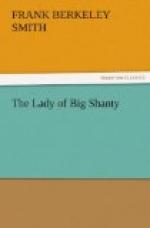Three days after Bergstein’s departure Holcomb sat in his cabin going over his accounts. When it grew dark he lighted his kerosene lamp and drew a chair beside his desk. As he bent over and unlaced his shoes the sash of the square cabin window in front of him was raised cautiously and four bony fingers slipped in and gripped the sill. As he sprang to his feet the gaunt face of a man rose slowly above the window sill and a pair of brilliant, cavernous eyes, framed in a shock of unkempt beard and sandy hair, stared into his own.
It was Bob Dinsmore—the hide-out. The next instant Holcomb was out of his boots and had raised the sash with a whispered welcome. With the quickness of a cornered cat Dinsmore was inside.
“It’s took me most a week to git this chance to see ye, Billy,” the hide-out began in a faint, husky voice weakened by exposure. He glanced about him nervously, his thin body shivering under the patchwork of skins and threadbare rags that covered him. Holcomb, without a word, crossed to the cupboard.
“Eat, Bob,” he said, putting a dish of cold meat and beans and another bottle on the table. For the space of a quarter of an hour the hide-out ate hurriedly in silence, his food and drink guarded between his soaked forearms like an animal fearful lest its prey be stolen. Holcomb watched him the while with now and then a friendly word. When he had finished eating, the cavernous eyes looked up gratefully.
“I dasn’t risk it until to-night, Billy,” he resumed. “When I seen that skunk Bergstein leave I thought I’d let ye know.” He leaned forward, one hand fumbling under the rags. “That’s what I found,” he said in a whisper, as he drew out a piece of twisted paper. “I had hard work to get it,” he added, carefully untwisting the fragment and disclosing a teaspoonful of whitish powder. “It may be pizon and it mayn’t—I ain’t tried it on nothin’ yet, but he was so all-fired perticler in hidin’ it I thought I’d bring it along.”
“Where did you find it?”
“Under that hell-hound’s mattress. He’s got more of it in a blue box. Thar warn’t nobody seen me. Damn him!”—he muttered—“it was him that told the sheriff last month down to Leetle Moose that he seen me cross his trail. I’d crep’ down to see my leetle gal, and he stepped ’most on top of us. We weren’t more ‘n forty rod this side o’ whar she lived, and the skunk went in and told how he’d seen somebody skulkin’ off, and, of course, they knowed then. They made it hot ’nough for me. I been layin’ for him ever since; I was watchin’ him through the winder when I see him hunt for this powder. Folks don’t keep stuff like that whar he kep’ it ’less it’s sumpin perticler. Somebody’ll find him in the woods some time with a hole in him.”
Holcomb laid the powder on the table. What he suspected he dared not formulate into words, let alone tell the hide-out.
“I ain’t never forgot ye, Billy, for what ye’ve done for me,” continued the hide-out with a choke in his feeble voice. Then, starting to his feet, the old fear returning, he whispered hoarsely:




